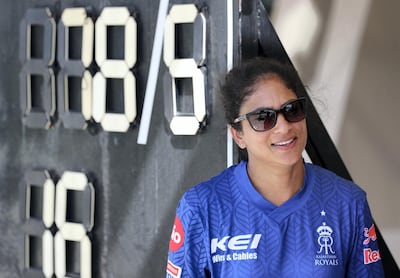When Shane Warne was appointed as the lone overseas captain in the pilot season of IPL in 2008, he was not 100 per cent sure what the present looked like, let alone the future.
Bollywood royalty outbidding cement magnates during a horse trade for the world’s leading cricketers. A posh English bloke with a gavel emceeing.
His own side had six different nationalities thrown together, including some who had won their places via a TV talent hunt, and others who could not speak his language.
And all playing a format that was still battling for credibility, let alone a joined up strategy.
By the end of that first season, he was acclaiming one of the greatest achievements of his career in leading Rajasthan Royals to the title.
While the IPL might have become an established - and highly profitable - part of the cricket landscape in the time since, life remains surreal 12 years on.
Now it is being played in empty stadiums that are only slightly less raucous than usual, as artificial crowd noise rolls around the empty stands, with giant LED screens filling in some of the gaps where the fans should be.
Warne himself has just emerged from two weeks inside a bio-secure bubble which is in place to guard against the effects of a global health crisis.
Considering all of that, maybe it was not so weird seeing Warne rock up to a girls training session at a lush green cricket facility in the desert on Wednesday afternoon.
Or the fact that he was not the only cricket Hall of Famer there, or the only former international leg-spinner.

Having Warne pressing the flesh – at a socially acceptable distance – while former Australia great Lisa Sthalekar bellowed encouragement to the players, and ex-Zimbabwe captain Graeme Cremer umpired, all felt perfectly normal, really.
Warne was there in his role as an ambassador for the franchise that he did so much to launch.
Rajasthan Royals opened an academy at The Sevens, Dubai this week, and the former Australia was a star attraction on Wednesday.
Sthalekar took a break from commentating on the IPL to oversee the girls training over the past three days. And Cremer is the academy’s permanent head coach.
It is the franchise’s first academy outside of India and the UK, and Warne hopes it will provide a route to the main side in the future.
“If we have all these academies, and manage to get some IPL players coming out of these academies, that would be fantastic,” Warne said.
“But I think it is just nice to get out into a social environment. Cricket is a very social thing.
"To have boys and girls interacting with each other, and learning from each other and inspiring each other, is great.
“Girls can knock over the boys, the boys can hit the girls for runs. It is a bit of fun.
“I think it is a really good concept we have got, and hopefully one day out of the academies we will get a Rajasthan Royals player.”
Warne believes his side’s win in 2008 was one of two things that helped cement the IPL in the cricket landscape.
“I think the Rajasthan Royals gave the IPL a lot of credibility,” he said.
“I think there were two things: Brendon McCullum’s 158 in the first innings, and the underdog coming good was also a great story.
“Straight away it grabbed people’s attention. From then on, it has got bigger and bigger.
"So yes, it was one of the greatest and most satisfying moments I have had in the game.”

When Warne said something similar back at the time, some critics suggested he had a short memory. But he remains clear in his viewpoint.
“I was lucky enough to play in an era of Australian cricket that was arguably, along with the West Indies side of the 1980s, and us in the 1990s, two of the greatest sides to have ever played the game,” he said.
“I played with some legends, and against some great players, won World Cups, Ashes and all those sorts of things, which was fantastic.
“I was voted one of the five greatest cricketers of all time. So I have been lucky enough to achieve some great things, which I’m very grateful for.
“But I don’t think people quite understood what I meant. When I said it was one of the greatest things I’ve done, I meant it was one of the most satisfying things I’ve done.
“That’s because we had six different cultures. At that time, T20 cricket was basically a bit of hit and giggle. No-one took it seriously.
“Players were in auctions for teams that were privately owned. No-one knew what was going on. People bidding for players was weird. It was the first time T20 was being taken seriously.
“Add all that into the mix, then take into account that we were the cheapest franchises, the underdogs, with 17-year-old players who couldn’t speak English, and guys who had won cricket TV programmes to be there.
“We didn’t have any big Indian players. I was the only non-Indian captain. Tendulkar, Dhoni, all the heavies were there.
“I was coach as well. So it was very satisfying.”




















